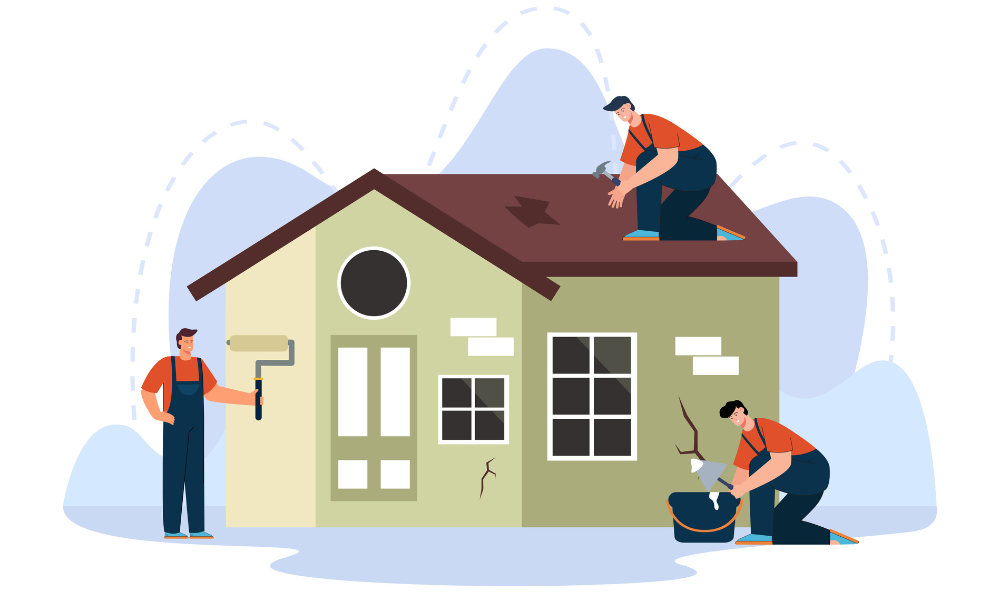39% of renters are stuck with landlords who refuse to repair their homes

A new study from Leaders Letting Agents uncovered the most common home repair issues that are set to plague homeowners and landlords this January. According to the research, which analysed Google search data across the UK, the number one issue is leaky taps – with an average monthly search volume of a staggering 3,788.33. Bad plumbing was closely followed by holes and cracks in the walls (1,626.67) and creaky floorboards (1,501.67).
And these costs really couldn’t come at a worse time. With mortgage rates and rents continuing to remain high, owners, renters and their landlords are already up against a lot of financial pressure.
As of January 2024, average rates for a two-year fixed mortgage sit around 4.14% for a 60% loan-to-value (LTV) ratio, with the Bank of England's Monetary Policy Committee recently reducing the base rate from 5.25% to 5% in an effort to manage inflation and stabilise the economy.
Despite these efforts, research from Fair4All Finance found that 44% of the adult population in the UK, equating to about 20.3 million people, are now officially considered financially vulnerable - with as many as 2.1 million households having missed or defaulted on at least one mortgage, loan, rent, or credit card bill – not a good time for home repair costs to start creeping in.
Top 10 common home repairs that could cost homeowners this January
|
Rank |
Home Repair Issue |
Average Monthly Search Volume |
|---|---|---|
|
1 |
Leaky taps |
3,788.33 |
|
2 |
Holes in the wall |
1,626.67 |
|
2 |
Cracks in walls |
1,626.67 |
|
3 |
Creaky floorboards |
1,501.67 |
|
4 |
Cracked tiles |
950.00 |
|
5 |
Loose toilet seat |
855.83 |
|
6 |
Cracks in ceilings |
778.33 |
|
7 |
Peeling paint |
770.83 |
|
8 |
Peeling wallpaper |
471.67 |
|
9 |
Creaky doors |
349.17 |
|
10 |
Mould on walls |
222.50 |
But what does this mean for new homebuyers – or individuals who are already struggling with high mortgage rates? Well, as Graeme Nichols, mortgage and protection specialist at West End Mortgages told Mortgage Introducer, it’s symptomatic of the hidden costs of homeownership.
“Inevitably part of buying any property if staying there long term, there will be home repair costs to some extent. If buying an older property there may be issues noted on a survey or home report around things like damp, roof, electrics or boiler issues, that could put people off buying these types of properties.
“You do have the option of getting a more detailed survey carried out for specific aspects of a property to provide you with added comfort should you choose to proceed with the purchase. With older properties, hidden repairs can put people off as quite often the costs can be very high depending on what may need doing. There may be underlying issues that may not be picked up on a survey that could end up being costly to fix when the time comes.
“We would always recommend a comprehensive home insurance policy is taken out against all properties.”
Renters stuck with landlords who refuse to repair homes
For landlords however, it’s another story completely. In the UK, landlords are legally obligated to maintain their rental properties and carry out necessary repairs to ensure the safety and habitability of the dwelling. This responsibility is mandated by several laws, including the Landlord and Tenant Act 1985, which requires landlords to keep in repair the structure and exterior of the property, as well as installations for the supply of water, gas, electricity, and sanitation.
Despite the legal obligations, 39% of UK renters report difficulties in getting landlords to carry out essential repairs, with an additional 14% of rental households failing to meet the government's 'Decent Homes Standard’ and 10% containing 'category one hazards' that pose significant health and safety risks.
“Landlords could lose out by not being able to charge the right level of rent or even lose tenants if their properties are in need of repair or are not energy efficient,” warned Nichols. “We also live in an age where people are more conscious about energy use from an environment perspective and also with the costs for utilities increasing drastically over the last few years.
“They are going to have to do it at one point, with new regulations being phased in around energy performance ratings. A,B or C energy performance ratings potentially allow landlords access to preferential mortgage deals. Grants and funding are available from the government to help assist in upgrading the property with the likes of insulation, new windows and new boilers, helping as much as possible to improve the energy performance rating for each property and also bring it in line with current and future standards, which in turn should be better for the tenants.”
And, if landlords refuse to upgrade their properties in the future to minimum standards, Nichols warn that they may not be able to able to rent the property out until this is done – as well as being prohibited from registering as a landlord if the property isn’t brought up to the minimum standard.
“Landlords who need help should speak to a mortgage broker to see what options there may be around funding, grants or releasing equity from the property to pay for the improvements or have a look at lenders websites for links and information around funding options from the government,” Nichols explained.



